I used openssl to generate a rootca certificate, device certificate and key for connecting to azure iot hub by following this documentation.
https://github.com/dotnet/samples/blob/main/iot/dotnet-iot-and-nanoframework/create-certificate.md
I also uploaded the rootca certificate to azure iot hub and verified it using proof of posession. However when i try running a python code using this ca certificate i get error, unable to get local issuer certificate for openSSL . I added the rootca and device certificate to the windows trusted root certificate store but it didnt solve the issue. I also installed pip_system_certs and python-certifi-win32 but to no avail.
from paho.mqtt import client as mqtt
import ssl
#import os
path_to_root_cert = "C:\\Users\\prana\\Downloads\\rootca.pem"
path_to_client_cert = "C:\\Users\\prana\\Downloads\\device.pem"
path_to_private_key = "C:\\Users\\prana\\Downloads\\device.key"
device_id = "iotdevice02"
iot_hub_name = "PASSDEMO1"
# Callback function when the client connects to the MQTT broker
def on_connect(client, userdata, flags, rc):
print("Device connected with result code: " + str(rc))
# Callback function when the client disconnects from the MQTT broker
def on_disconnect(client, userdata, rc):
print("Device disconnected with result code: " + str(rc))
# Callback function when a message is published
def on_publish(client, userdata, mid):
print("Device sent message")
# Create an MQTT client instance
client = mqtt.Client(client_id=device_id, protocol=mqtt.MQTTv311, clean_session=0)
# Set the callback functions
client.on_connect = on_connect
client.on_disconnect = on_disconnect
client.on_publish = on_publish
# Set TLS/SSL configuration
client.tls_set(ca_certs=path_to_root_cert, certfile=path_to_client_cert, keyfile=path_to_private_key, cert_reqs=ssl.CERT_REQUIRED, tls_version=ssl.PROTOCOL_TLSv1_2, ciphers=None)
client.tls_insecure_set(False)
# Connect to the MQTT broker
client.connect(iot_hub_name + ".azure-devices.net", port=8883)
# Publish a message to a topic
client.publish("devices/" + device_id + "/messages/events/", '{"hello":129029}', qos=1, retain=True)
# Start the MQTT client loop
client.loop()
